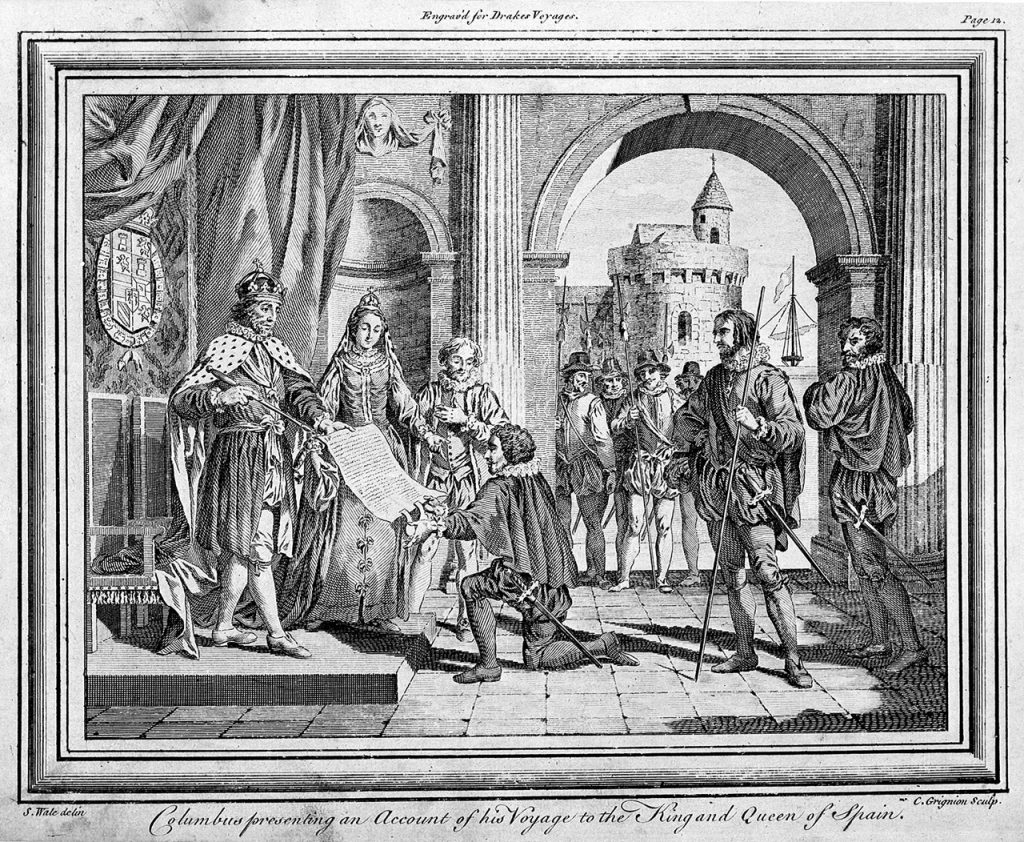The voyage and expedition that changed the world forever was captained by the adventurous Christopher Columbus. Our story begins with him as a young lad, who had a heart for adventure and an extensive imagination.
Christopher Columbus had an obsession with trade at a very young age. This was because his father was in debt “and only by trade can money be quickly got to pay debts.”1 Christopher Columbus had little education, having been an apprentice to a trader when he was young.2 Even though he did not grow rich through trade, he was satisfied with his life as a trader. Columbus gained confidence and skill navigating and trading on the Mediterranean sea.3 He also learned physical and commercial geography while trading. After learning many of these things, he became an excellent tradesman and in his adulthood excelled at his craft.

In adulthood, Columbus continued to trade, though he now became infatuated with discovering new trade routes. Through this infatuation, he began to seek a trade route by sea to India. To start such an expedition, he would need money and approval, which he sought from many royal families. Columbus originally went to seek approval from Portugal’s king, John II. After being shut down by King John II, he went to Spain’s Ferdinand and Isabelle, who also told him no. After that, he went to the first Duke of Medina Sidonia, who yet again told him no. Finally, Columbus went to talk to the Duke of Medina Coeli. While Columbus was talking with the Duke, Queen Isabelle sent a message saying she wanted to meet with Columbus. The Queen had become interested in his expedition, but she left the judgement of it up to the King. The King, seeing Columbus’ importance, had a committee created so it could decide whether or not to allow the expedition, and he kept Columbus at court while the committee decided.
In 1488, Columbus went to Portugal only to find that “a Portuguese navigator Bartholomew Dias… had at least succeeded in rounding the southern tip of Africa…”4 This made him aware that he could have found a route to India if he had not been held at court these many years. Columbus finally received approval in Castile with the Custodian, Friar Juan Perez. Perez had friends in high places and when the Reconquista finally ended in Spain between Christians and Muslims, the King and Queen said, “Let this man be employed.”5 With the King and Queen of Spain providing support for his voyage, Christopher Columbus set off in the year 1492.
From the start of Columbus’s voyage problems arouse. One of these problems was that their ship Pinta had a rudder that came loose and could not be fixed until many days later.6 More problems arose when they discovered that the curvature of the Earth was affecting the compasses, which affected their navigation. At dawn, after a night of navigating by stars, their compass told them that they were many degrees off course. They didn’t start seeing signs of land until the fourth of October. On October 13, they finally reached land.7 On this land, they met the native people who inhabited the land.

“Christopher Columbus became one of the most important figures in western civilization by changing the very thrust of European expansion for the next five hundred years.”8 New industries, such as the sugar cane industry, started to open through his arrival in the New World. The founding of the New World also expanded the power of many imperial lands. The kings and queens of the lands of Europe sent people to the “New World” for colonization and to use its resources.
Christopher Columbus endured many struggles during his quest in trying to find a route to India. He impacted the world politically, economically, and culturally. Christopher Columbus was persistent and did everything he could to achieve his goals. Even though he did not reach the goal he wanted, he did make one of the greatest discoveries in history.
- Daniel Sargent, Christopher Columbus (Milwaukee: The Bruce Publishing Co., 1941), 4. ↵
- Salem Press Biographical Encyclopedia, January 2016, s.v. “Christopher Columbus 1451- 1506,” by Daniel C. Scavone. ↵
- Daniel Sargent, Christopher Columbus (Milwaukee: The Bruce Publishing Co., 1941), 9. ↵
- Daniel Sargent, Christopher Columbus (Milwaukee: The Bruce Publishing Co., 1941), 83. ↵
- Daniel Sargent, Christopher Columbus (Milwaukee: The Bruce Publishing Co., 1941), 89. ↵
- Oliver Dunn and James E. Kelley Jr., The Dario of Christopher Columbus’s first Voyage to America (United States of America: University of Oklahoma Press, 1989), 25. ↵
- Oliver Dunn and James E. Kelley Jr., The Dario of Christopher Columbus’s first Voyage to America (United States of America: University of Oklahoma Press, 1989), 51-69. ↵
- James Cortada, “Who was Christopher Columbus,” Renaissance and Reformation 10, no. 2 (1974): 99. ↵



26 comments
Meadow Arriaga
Christopher Columbus faced many complications throughout the entire duration of this expedition. People in power did not have much interest in aiding Columbus for his idea. He was very wise to start a committee to support this voyage. With is his experience in trade, Columbus wanted to find an easier route for his advantage. His determination led to him to new discoveries. Although it was not apart of his original plan, he benefitted tremendously from this, forever changing history.
Makenzie Santana
As Christopher Columbus is one of the most popular topics within history lessons, it is interesting to read up about him and refresh my knowledge about him. I think this article did a great job giving information even though it’s what everyone basically already knows about Columbus and his findings in the New World. What I didn’t know was that Columbus had a genuine love for trading and that what instigated his pursue in trading was his father being in debt and using trading as a way to get out of it.
Aneesa Zubair
I liked reading about how Christopher Columbus’ background in trading to pay his father’s debts led to his voyage to the New World. It was also interesting to read about how many times he was rejected before he could make the voyage. The conclusion could have been longer, though. I would have liked to read more about the impact his arrival in the Americas had (both on the world and Columbus himself). Otherwise, this was a very informative article!
Alexander Manibusan
Although Columbus wasn’t the first to discover the Americas, and quite frankly isn’t my most favorite person in history, this article did point out why we keep talking about him. Because of Columbus, new doors were open, such as the sugar cane industry, as well as the discovery of potatoes, chocolate, avocado, and so forth. While he didn’t accomplish his new route to India, he unlocked countless opportunities for the old world.
Bictor Martinez
There has always been those people who hate on Christopher Columbus for having claimed land that was not originally his. I agree with these people however, I also think what life would be like if Columbus had never found the “new world.” His discovery was able to help England expand and use it resources that they did not have on the other side of the world. Nonetheless we should be grateful for Columbus and his curiosity
Damian Jennings
I understand that Christopher Columbus was constantly rejected by people of higher power, they denied him the ability of traveling the seas; but he did not let this discourage him at all. Christopher would continue asking people to allow this travel to take affect. After his talk with the Duke of Medina Coeli, a Queen became very interested in his journey. Her name was Queen Isabelle, it was then that Christopher could begin his voyage. Through repeated denial he was finally granted the ability to pursue his passion.
Greyson Addicott
We can only imagine how the world would look without the birth of one Christopher Columbus. All warm-blooded Americans alive today owe their entire lives to the very man. Indeed, millions of us would never have been born without his (then accidental) discovery! It was very interesting to read about the Earth naturally resisting the exploration, and I am so glad that Columbus pushed onward instead of returning to Spain empty-handed. I can only imagine his joy when he finally touched land, rather than slipping off the side of the Earth itself!
Luis Morales
Everyone knows the story about Christopher Columbus and his journey that lead him to the discovery on the new world. However, what I did not know was that this discovery would not have happen if it were not for Columbus’ fascination with trade. Even though Columbus was told know many times, he was persistence in what he wanted and finally was able to achieve his goal in life to find an new route to India. Great article!
Tyler Thompson
Columbus indeed changed the world with his accidental discovery of the route to the Americas. Despite the many reasons Columbus’ name is hated on, the author was able to write a very good and unbiased article on the struggles of Christopher Columbus, especially in the beginning with financing the boat, as he navigated his ship to what we know as North and South America.
Anais Del Rio
When I first clicked the article, I was expecting to read how Christopher Columbus ended up finding modern day North America which is how we were first taught, but this later changed to Amerigo Vespucci (hence America). This was a great memory jogger about the history of Columbus and the process he had to go through to get to his destination. It was actually new to learn that the Earth was giving them a hard time to navigate because of the compasses messing up.